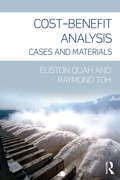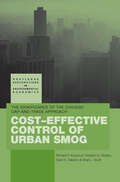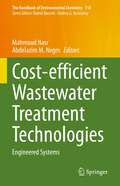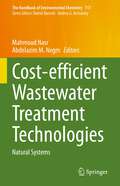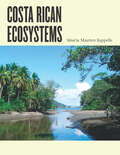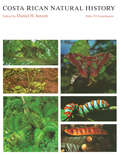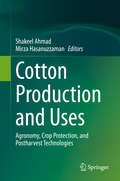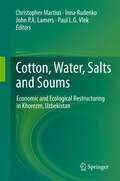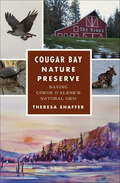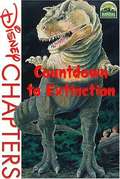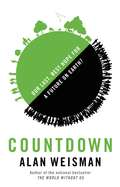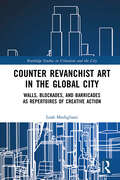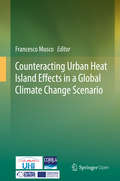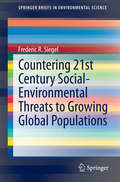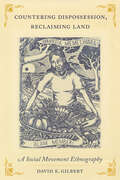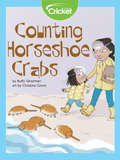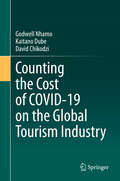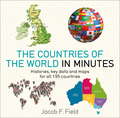- Table View
- List View
Cost-Benefit Analysis: Cases and Materials
by Euston Quah Raymond TohCost-benefit analysis (CBA) is the systematic and analytical process of comparing benefits and costs in evaluating the desirability of a project or programme, often of a social nature and for society as a whole. CBA is fundamental to government decision-making and can be an effective tool for informed decisions on the use of society's scarce resources. This book highlights the main concepts and principles of cost-benefit analysis used in real life cases and actual applications. The book contains rich cases, materials and examples of real life CBA applications with emphasis both on physical and non-physical projects and infrastructure developments in Asia and beyond. The book also discusses techniques frequently used in applied CBA. The first part of the book introduces the key concepts and principles of CBA before Part Two covers some pertinent issues relating to CBA, such as the recent trend of using behavioural economics and frequently used techniques in applied CBA. Finally, in Part Three, case studies are written up to illustrate how CBA is done, and questions for the readers and students to ponder are raised at the end of each chapter. The scope of the case studies is more than just physical infrastructures but will include public sector policies and programmes covering a host of social policies as in health, education, social welfare programmes, and the environment. For each case, there will be illustrations of the key concepts and principles of CBA used. Undertakings analyzed include: the Three Gorges Dam in China the 2008 Beijing Olympics the Costs of Global Warming the Jamuna Bridge in Bangladesh The case studies, many of which have taken or are to take place in developing countries provide a rich background to the principles of the method, and are accompanied by a wealth of explanatory material. As well as being suitable for courses in Cost-Benefit Analysis, Public Finance, Environmental and Health Economics, the book should be of interest to all public policy decision makers and planners.
Cost-Effective Control of Urban Smog: The Significance of the Chicago Cap-and-Trade Approach (Routledge Explorations in Environmental Economics)
by Richard Kosobud Houston Stokes Carol Tallarico Brian ScottContaining rigorous hard evidence, this book is of immense practical use to postgraduates, researchers and business communities affected by or working in environmental regulation. The author, a leading name in the environmental economics community, examines the problem of urban smog in cityscapes and the difficulty of achieving cost-effective controls. Analyzing the key areas of urban smog, low-level ozone and volatile organic compound emissions and their impact on health and welfare of communities this text assesses and evaluates the performance of emissions trading systems and suggests alternative market designs for incentive control of pollution. Taking a well-reasoned approach to the contentious area of the use of market incentives to achieve environmental goals, it provides a study of the pioneering cap-and-trade market, particularly focusing on its poor performance in Chicago. A perfect supplementary text postgraduates and researchers, this is also an essential read for all those interested in environmental economics.
Cost-efficient Wastewater Treatment Technologies: Engineered Systems (The Handbook of Environmental Chemistry #118)
by Abdelazim M. Negm Mahmoud NasrThis is the second of two volumes that together provide a comprehensive overview of the current sustainable and low-cost wastewater treatment technologies applied in communities that lack the financial and technical resources needed for an environmental, disease prevention and health nexus. This book reviews engineered wastewater treatment technologies and discusses their application in regard to greenhouse gas emissions, natural resource utilization, land-use, and energy and water savings. The chapters from expert contributors cover topics such as aerobic and anaerobic biological treatments, chemical treatments and precipitation, and disinfection. Readers will also learn about simplified and low-energy wastewater treatment plants, strategies for wastewater reuse, and nanotechnologies for wastewater environmental management. The feasibility regarding time and cost of implementing such technologies is also discussed in this book, and particular attention is given to the removal of conventional and emerging pollutants, toxicants, and heavy metals. Given the breadth and depth of its coverage, the book offers an invaluable source of information for researchers, students and environmental managers alike.
Cost-efficient Wastewater Treatment Technologies: Natural Systems (The Handbook of Environmental Chemistry #117)
by Abdelazim M. Negm Mahmoud NasrThis is the first of two volumes that together provide a comprehensive overview of the current sustainable and low-cost wastewater treatment technologies applied in communities that lack the financial and technical resources needed for an environmental, disease prevention and health nexus.This book reviews natural wastewater treatment technologies and traces the current challenges in wastewater management and sustainability. Divided into 4 themed parts, the chapters from expert contributors cover topics such as simplified and low-energy natural treatment facilities, bioremediation and biotechnology for green future, environmental impact assessment of wastewater reuse, wastewater management and sustainability for irrigation, high-performance and cost-effective biosorbents for heavy metals removal, and eco-friendly nanomaterials for wastewater environmental management. The readers will discover essential recommendations for improving natural treatment systems to withstand emerging contaminants, namely, endocrine disruption chemicals, surfactants, personal care products, pesticides, and pharmaceuticals. Readers will also find valuable guidelines to ensure sustainable and innovative solutions for wastewater treatment in the light of climate change, resource, demand, and funding challenges.Given the breadth and depth of its coverage, the book offers an invaluable source of information for researchers, students and environmental managers alike.
Costa Rican Ecosystems
by Maarten KappelleIn the more than thirty years since the publication of Daniel H. Janzen’s classic Costa Rican Natural History, research in this small but astonishingly biodiverse, well-preserved, and well-studied Latin American nation has evolved from a species-level approach to the study of entire ecosystems. And from the lowland dry forests of Guanacaste to the montane cloud forests of Monteverde, from the seasonal forests of the Central Valley to the coastal species assemblages of Tortuguero, Costa Rica has proven to be as richly diverse in ecosystems as it is in species. In Costa Rican Ecosystems, Maarten Kappelle brings together a collection of the world’s foremost experts on Costa Rican ecology—outstanding scientists such as Daniel H. Janzen, Jorge Cortés, Jorge A. Jiménez, Sally P. Horn, Robert O. Lawton, Quírico Jiménez M., Carlos Manuel Rodríguez, Catherine M. Pringle, and Eduardo Carrillo J., among others—to offer the first comprehensive account of the diversity, structure, function, uses, and conservation of Costa Rica’s ecosystems. Featuring a foreword and introductory remarks by two renowned leaders in biodiversity science and ecological conservation, Thomas E. Lovejoy and Rodrigo Gámez Lobo, in addition to chapters highlighting the geology, soils, and climate of Costa Rica, as well as the ecosystems of its terrestrial, freshwater, and marine habitats, and including previously unpublished information on Isla del Coco, this beautiful color-illustrated book will be an essential reference for academic scientists, students, natural history guides, conservationists, educators, park guards, and visitors alike.
Costa Rican Natural History: With 174 Contributors
by Daniel H. JanzenThis volume is a synthesis of existing knowledge about the flora and fauna of Costa Rica. The major portion of the book consists of detailed accounts of agricultural species, vegetation, amphibians, reptiles, mammals, birds, and insects. "This is an extraordinary, virtually unique work. . . . The tremendous amount of original, previously unpublished, firsthand information is remarkable."—Peter H. Raven, Director, Missouri Botanical Garden "An essential resource for anyone interested in tropical biology. . . . It can be used both as an encyclopedia—a source of facts on specific organisms—and as a source of ideas and generalizations about tropical ecology."—Alan P. Smith, Ecology
Cotorras sobre Puerto Rico: (Parrots Over Puerto Rico)
by Susan L. Roth Cindy TrumboreRobert F. Sibert Informational Book Award - American Library Association (ALA)Un libro ilustrado de no ficción sobre la historia de Puerto Rico y la cotorra puertorriqueña, que se recuperó del borde de la extinción.Durante siglos, las bellas y escandalosas cotorras puertorriqueñas y los pobladores de la isla de Puerto Rico buscaron alimentos, sobrevivieron a los huracanes, cuidaron su descendencia y protegieron sus casas. Pero las cosas comenzaron a cambiar y, con el tiempo, los árboles donde anidaban las cotorras fueron destruidos. En 1967, solo quedaban veinticuatro cotorras en estado silvestre. Los humanos casi habían causado su extinción. ¿Serían capaces de salvarlas? Al igual que hicieron en su premiado libro El mangle, Roth y Trumbore cuentan dos historias apasionantes. Ven a descubrir las fascinantes historias entrelazadas de Puerto Rico y de las singulares cotorras que viven en las copas de los árboles de la isla.
Cottage Daze
by James RossThe comfort food of cottage life books — satisfying, unforgettable, and inevitably nostalgic. Cottage Daze celebrates life at the cottage where the cottage is the main character, and family, friends, pets, and fellow cottagers are the supporting cast. Whether writing about cottage routine ("First Ski," "Of Mice and Men," "Cottage Guests"), cottage tasks ("Splitting Wood," "Boat Launch"), nature ("A Gathering of Loons," "The Sting," "Autumn Spell"), cottage fun ("The Cottage Duel"), or cottage touchstones ("Start the Day," "Bonfire," "The Perfect Storm"), the stories are told with humour, compassion, insight, and nostalgia. Who doesn’t remember sitting in a frigid lake, trying to help a youngster get up on water skis for the first time, launching a boat while the whole world seems to be watching, or getting caught up in a nest of wasps? This collection of stories, elegantly organized into four seasons (spring, summer, autumn, and winter), will make readers laugh, cry, and long to be at the cottage a "must have" for every cottage bookshelf.
Cotton Production and Uses: Agronomy, Crop Protection, and Postharvest Technologies
by Mirza Hasanuzzaman Shakeel AhmadThis book provides a comprehensive and systematic overview of the recent developments in cotton production and processing, including a number of genetic approaches, such as GM cotton for pest resistance, which have been hotly debated in recent decades. In the era of climate change, cotton is facing diverse abiotic stresses such as salinity, drought, toxic metals and environmental pollutants. As such, scientists are developing stress-tolerant cultivars using agronomic, genetic and molecular approaches. Gathering papers on these developments, this timely book is a valuable resource for a wide audience, including plant scientists, agronomists, soil scientists, botanists, environmental scientists and extention workers.
Cotton Top
by Jean O'NeillSarah Jane (nicknamed Cotton Top) is a little Appalachian girl who is thankful for everything she has until a little girl from the city comes to visit. Then she learns new reasons to appreciate everything about her home.
Cotton and Flax Fibre-Reinforced Geopolymer Composites: Synthesis, Properties and Applications (Composites Science and Technology)
by It-Meng Low Thamer Alomayri Hasan AssaediThis book provides an overview on the latest advances in the synthesis, properties and applications of geopolymers reinforced with natural fibres such as pulp fibre, cotton, sisal, flax and hemp. The influence of adding various natural fibres and nanofillers on the mechanical properties of these composites is discussed. Potential challenges and future directions of these composites are highlighted and addressed. The content of this book caters to students, researchers and academics who are interested in the synthesis and applications of geopolymers composites.
Cotton, Water, Salts and Soums: Economic and Ecological Restructuring in Khorezm, Uzbekistan
by Inna Rudenko P.L.G. Vlek John P.A. Lamers Christopher MartiusThis book summarizes a long-term research project addressing land and water use in the irrigated areas of the Aral Sea basin. In an interdisciplinary approach, natural and human sciences are combined to elucidate the challenges of economic transition that affect the use of land, water and biological resources, ecological sustainability, economic efficiency and the livelihoods of the local population. The research focuses on Khorezm, a region in Uzbekistan, located on the Amudarya river, in the heart of Central Asia. A series of chapters describes the biophysical environment and the aspects of society and institutions that shape land and water use. The book discusses options and tools to improve land and water management, and to reform the economic system management, based on agronomic, hydrological, economic ans social studies and modeling. The insights are not only important for Uzbekistan, but for all countries in transitions and irrigated dryland areas elsewhere.
Cougar Bay Nature Preserve: Saving Coeur d'Alene's Natural Gem (The History Press)
by Theresa ShafferFighting for Ecological HeritageIn 1992, a Hawaiian developer proposed a subdivision on Cougar Bay's northern shore, just two miles south of Coeur d'Alene. Dedicated, tenacious locals took on the seemingly impossible goal of stopping the "Cougar Beach" development. Unlikely allies--environmental activists and a cantankerous landowner--banded together. Private and public groups stepped up. In 1997, The Nature Conservancy purchased major shoreline areas and created a nature preserve. The sanctuary remained unaltered until more private land was gifted to the Bureau of Land Management and Kootenai County. After thirteen years of heroic perseverance, the Cougar Bay Nature Preserve became a reality. Idaho Wildlife Viewing Guide calls it one of the state's best wildlife viewing sites. Theresa Shaffer chronicles the battle to preserve this oasis for locals, visitors and wildlife alike.
Cougar: Ecology and Conservation
by Maurice Hornocker Sharon NegriThis compilation of recent findings, stunning photographs, and firsthand accounts of field research unravels the mysteries of the magnificent animal Cougar and emphasizes its importance in healthy ecosystem processes and in our lives.
Countdown to Extinction
by Barbara Gaines WinkelmanChildren's book about the study and research into dinosaurs that have become extinct.
Countdown: Our Last, Best Hope for a Future on Earth?
by Alan WeismanA powerful investigation into the chances for humanity's future from the author of the bestseller The World Without Us.In his bestselling book The World Without Us, Alan Weisman considered how the Earth could heal and even refill empty niches if relieved of humanity's constant pressures. Behind that groundbreaking thought experiment was his hope that we would be inspired to find a way to add humans back to this vision of a restored, healthy planet-only in harmony, not mortal combat, with the rest of nature.But with a million more of us every 4¿ days on a planet that's not getting any bigger, and with our exhaust overheating the atmosphere and altering the chemistry of the oceans, prospects for a sustainable human future seem ever more in doubt. For this long awaited follow-up book, Weisman traveled to more than 20 countries to ask what experts agreed were probably the most important questions on Earth--and also the hardest: How many humans can the planet hold without capsizing? How robust must the Earth's ecosystem be to assure our continued existence? Can we know which other species are essential to our survival? And, how might we actually arrive at a stable, optimum population, and design an economy to allow genuine prosperity without endless growth?Weisman visits an extraordinary range of the world's cultures, religions, nationalities, tribes, and political systems to learn what in their beliefs, histories, liturgies, or current circumstances might suggest that sometimes it's in their own best interest to limit their growth. The result is a landmark work of reporting: devastating, urgent, and, ultimately, deeply hopeful.By vividly detailing the burgeoning effects of our cumulative presence, Countdown reveals what may be the fastest, most acceptable, practical, and affordable way of returning our planet and our presence on it to balance. Weisman again shows that he is one of the most provocative journalists at work today, with a book whose message is so compelling that it will change how we see our lives and our destiny.
Counter Revanchist Art in the Global City: Walls, Blockades, and Barricades as Repertoires of Creative Action (Routledge Studies in Urbanism and the City)
by Leah ModiglianiThrough analyses of public artworks that have taken the form of blockades and barricades since the 1990s, this book theorises artists’ responses to global inequities as cultural manifestations of counter-revanchism in diverse urban centres. This book is the first to analyse artworks as forms of counter-revanchism in the context of the rise of the global city. How do artists channel the global spatial conflicts of the 21st century through their behaviours, actions, and constructions in and on the actually existing conditions of the street? What does it mean for artists—the very symbol of freedom of personal expression—to shut down space? To refuse entry? To block others’ passage? The late critical geographer Neil Smith’s influential writing on the revanchist city is used as a theoretical frame for understanding how contemporary artists engender the public sphere through their work in public urban spaces. Each chapter is a case study that analyses artworks that have taken the form of walls and barricades in China, USA, UK, Ukraine, and Mexico. In doing so, the author draws upon diverse fields including art history, geography, philosophy, political science, theatre studies, and urban studies to situate the art in a broader context of the humanities with the aim of modelling interdisciplinary research grounded in an ethics of solidarity with global social justice work. Collectively these case studies reveal how artists’ local responses to urban revanchism since the end of the Cold War are productive reorientations of social relations and harbingers of worlds to come. By using plain language and avoiding excessive academic jargon, the book is accessible to a wide variety of readers. It will appeal to scholars and graduate students in the fields of studio art, modern and contemporary art history, performance studies, visual culture, and visual studies; especially in relation to those interested in conceptual practices, performance art, site-specificity, public art, political activism, and socially engaged art. Cultural geographers and urban theorists interested in the social and political ramifications of temporary and everyday urbanism will also find the analysis of artworks relevant to their own studies.
Counteracting Urban Heat Island Effects in a Global Climate Change Scenario
by Francesco MuscoUrban heat islands are a new type of microclimatic phenomenon that causes a significant increase in the temperature of cities compared to surrounding areas. The phenomenon has been enforced by the current trend towards climate change. Although experts consider urban heat islands an urgent European Union public health concern, there are too few policies that address it. The EU carried out a project to learn more about this phenomenon through pilot initiatives. The pilots included feasibility studies and strategies for appropriately altering planning rules and governance to tackle the problem of urban heat islands. The pilots were carried out in eight metropolitan areas: Bologna/Modena, Budapest, Ljubljana, Lodz, Prague, Stuttgart, Venice/Padova, and Vienna. The feasibility studies carried out in these pilot areas focused on the specific morphology of EU urban areas, which are often characterised by the presence of historical old towns.
Countering 21st Century Social-Environmental Threats to Growing Global Populations (SpringerBriefs in Environmental Science)
by Frederic R. SiegelThis book brings together in a single volume a grand overview of solutions - political, economic, and scientific - to social and environmental problems that are related to the growth of human populations in areas that can least cope with them now. Through progressive adaptation to social and environmental changes projected for the future, including population growth, global warming/climate change, water deficits, and increasing competition for other natural resources, the world may be able to achieve a fair degree of sustainability for some time into the future.
Countering Dispossession, Reclaiming Land: A Social Movement Ethnography
by David E. GilbertTwo decades ago, a group of Indonesian agricultural workers began occupying the agribusiness plantation near their homes. In the years since, members of this remarkable movement have reclaimed collective control of their land and cultivated diverse agricultural forests on it, repairing the damage done over nearly a century of abuse. Countering Dispossession, Reclaiming Land is their story. David E. Gilbert offers an account of the ways these workers-turned-activists mobilized to move beyond industrial agriculture's exploitation of workers and the environment, illustrating how emancipatory and ecologically attuned ways of living with land are possible. At a time when capitalism has remade landscapes and reordered society, the Casiavera reclaiming movement stands as an inspiring example of what struggles for social and environmental justice can achieve.
Counting Horseshoe Crabs
by Buffy SilvermanJenny has read all about horseshoe crabs and is excited to visit the beach and count them with her mom. By counting the horseshoe crabs, Jenny is helping scientists to protect the crabs that are migrating. She learns how the horseshoe crab migration can even benefit migrating shorebirds. When Jenny grows up, she definitely wants to be a scientist!
Counting Sheep: Reflections and Observations of a Swedish Shepherd
by Axel LindénNorwegian Wood meets The Tao of Pooh in this philosophical, witty, and heartwarming collection of daily observations from a Swedish academic-turned-sheep farmer who finds peace and meaning outside the hustle and bustle of modern, urban life. One of the fun things about keeping sheep is that now and then it feels like something other than a job or a duty. Perhaps the feeling can best be summed up by the idea that it’s not I who keep the sheep, but the sheep who keep me. When Axel Lindén leaves his literary life in the city for the farm he unexpectedly inherits—along with the ever-escaping flock of sheep that comes with it—he has a fairly naïve notion of what farm life will be: pure drudgery. But as time passes and Axel slowly settles into the rhythms of the farm and shepherding, his naiveté fades away and is gradually replaced with a new appreciation of the spiritual and emotional value of manual labor, caring for other living things, and staying connected to the earth. Capturing his observations and thoughts in short diary entries, Counting Sheep is a meditative and irresistibly delightful book that delves into the small wonders of our world and celebrates pastoral life, demonstrating that it’s often the little things in life that mean the most.
Counting on Snow
by Maxwell NewhouseMaxwell Newhouse, folk artist extraordinaire, has created a unique counting book. The premise is simple. He invites children to count with him from ten crunching caribou down to one lonely moose, by finding other northern animals - from seals to wolves to snowy owls - as they turn the pages. But as the animals appear, so does the snow, until it's a character too, obliterating light and dark, sky and earth. A gorgeous exploration of the isolation and the beauty of northern winter, Maxwell Newhouse has created a deceptively simple picture book that can be enjoyed by all ages.
Counting the Cost of COVID-19 on the Global Tourism Industry
by Godwell Nhamo Kaitano Dube David ChikodziThis book profiles preliminary findings on the impact of COVID-19 on the travel, tourism and hospitality sector. Starting with a narrative relating COVID-19 to the global development agendas, the book proceeds with a focus on global tourism value chains and linkages between COVID-19 and the Sustainable Development Goals (SDGs). Other perspectives addressed in separate chapters include impacts of COVID-19 on various industries within the global tourism value chain including aviation, airports, cruise ships, car rentals as well as ride and share car services, hotels, restaurants, sporting, pilgrimage and religious tourism, gaming and entertainment, and the stock market. The book also includes chapters on corporate, philanthropic and public donations, as well as tourism economic stimulus packages. It then concludes with a chapter focusing on building back a better tourism sector post-COVID-19 that strongly draws from the Sendai Framework on Disaster Risk Reduction (2015-2030) and the disaster cycle. To this end, this book is suitable as a read for several professionals in disciplines such as tourism and hospitality studies, economics, sustainable development, development studies, environmental sciences, geography, politics, planning and public health.
Countries of the World in Minutes (IN MINUTES)
by Jacob F. FieldThe Countries of the World in Minutes is the quickest way to understand the modern world and every country in it.For each of the 195 officially recognised countries of the world, a mini-essay clearly and concisely explains its key history, characteristics and social and political structures. Alongside, an outline map shows each country's global location, main geographic features and capital city, whilst a table of essential data details its population, political system, languages, major religions, currency, gross domestic product, main industries, and much more.Illustrated with 195 up-to-date country maps.
